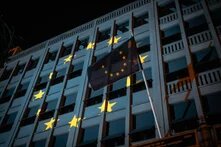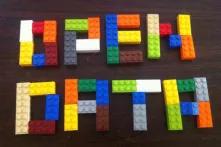Efforts to follow social distancing and mask-wearing rules have been crucial to South Korea’s success in containing the Covid-19 pandemic, but experts worry that other measures—such as sharing data from confirmed cases—have stigmatised and harmed marginalised communities.

Inspired by the global phenomenon of K-pop, the South Korean government proudly named its Covid-19 countermeasure the “K-quarantine model.” In addition to widespread testing, public safety campaigns, and strict quarantine rules, the South Korean response relies on collecting private data in order to trace infection routes and inform residents about probable exposure. Though now pushed to its limits by rapidly rising case numbers, the K-quarantine model was widely praised for helping the government successfully contain outbreaks at the beginning of 2020.
It is only possible to collect information to this degree because of South Korea’s highly developed digital infrastructure. South Korea’s government regularly tops global e-government rankings, as well as metrics of broad usage of smartphones and digital services by population. In a democracy, an approach like this also depends on the population’s cooperation, as the use of credit card records, location data from telecommunication providers, and surveillance-camera footage could be seen as government overreach. However, President Moon Jae-in’s governing Democratic Party won a landslide victory last April, suggesting strong approval of the K-quarantine model and information-sharing.
Countries around the globe have been discussing the proper usage of data during the pandemic. In South Korea, the debate is not focused on contact-tracing and data collection itself, as civil society organisations agree that data collection is inevitable for public health reasons. However, they worry that publicly sharing overly detailed information about confirmed cases infringes personal rights, especially when the information can be used by the media to fearmonger. Sharing high amounts of personal data can be devastating for marginalised communities, as shown by the so-called Itaewon cluster and the reaction of South Korean society.
Data transparency in the K-quarantine model
Some of these data-collecting measures are familiar to South Koreans, since many were already in place during the MERS-COV outbreak in 2015. Civil society organisations such as People’s Solidarity for Participatory Democracy (PSPD) point out that the current data sharing strategy is the direct result of the criticism the South Korean government faced after the MERS outbreak six years ago. Back then, the government’s reaction was widely criticised for being too slow and therefore causing infections to spread widely.
This time, the Korean CDC announced pre-emptive guidelines for disease containment and promised that it would share “sufficient” information about the infectious disease to protect the right to know and promote the health of its citizens, said Jun Yim, the head of the center for public healthcare policy of the Korean National Medical Center (NMC), in an interview. On February 26, 2020, the government passed The Infectious Disease Control and Prevention Act, which outlined new rules for how the central and local governments could share relevant pandemic data.
Unlike in 2015, the data from confirmed Covid-19 cases are now featured on the Korea Disease Control and Prevention Agency (KCDA) website. This website displays details such as age, nationality, and region of residence. It also includes a list of places that people with confirmed cases have visited. Smartphone users receive emergency alerts when they are in areas that have been exposed to the virus.
How data sharing can create social stigma
Civil society organisations like PSPD and Jinbonet accept the collection and use of data as necessary to prevent further outbreaks. However, these organisations are worried that local governments have misinterpreted the data use guidelines in the Infectious Disease Control and Prevention Act and put people at risk.
Though the central government posts information on the KCDA website, it anonymizes this data—for example, revealing that out of 30 cases in Seoul, 12 are male and 20 people are in their 20s. Local governments have the authority to distribute this type of information to their residents via text message. Unlike the central government, however, some local governments sent out detailed SMS messages for each confirmed case, sharing information about where each particular patient visited, along with their gender and age and area of residence. This format made it easy to track down individuals, yet was not actually useful for containing the virus.
Though there remains debate over the extent of information-sharing necessary for the government to fulfill the right to know, publicly disclosing details of the specific restaurants and shops visited by confirmed cases is not necessary from an epidemiological point of view, according to Yim from NMC. Contact-tracing measures already provide epidemiologists and public health personnel with enough information on the confirmed cases to disinfect and temporarily close affected venues to prevent further disease spread. Detailed personal information about these cases should be shared publicly only when the existing information is insufficient for prevention and adequate countermeasures, added Yim.
Instead, the detailed information shared by local governments was used in media reports that have done great harm. In May 2020, this data revealed that some confirmed Covid-19 cases originated from those who had visited a club in Itaewon, a neighborhood of Seoul. By this point, the media had already stirred up curiosity about each confirmed case. After the newspaper Kukmin Ilbo, founded by a conservative Christian church, reported that the club in Seoul with confirmed cases was a gay club, the gay community became the target of nationwide hatred.
South Korea has a very low acceptance of the queer community compared to other OECD countries. As a result of widespread anti-LGBTQ sentiment, many South Koreans are not voluntarily out. Those who identify as queer often refrain from sharing their sexual orientations and gender identities.
LGBTQ activist groups in Seoul have said that singling out gay nightclubs and revealing the presence of gay people in these locations was irrelevant to contact tracing. Though the club in Itaewon was only one of many sites with confirmed cases, the gay community was described by many media outlets as the “virus-carriers polluting society.” Many people were forcibly outed and then subjected to discrimination from both work and home.
Asking around the LGBTQ community in Seoul, many members still suffer from this tragic event. One person even stated that “at one point, everyone was more scared of being outed than [of] contracting Covid-19.” The media painted a picture of gay men as the drivers of infection – a painful reminder of the AIDS crisis and the social stigma it created. As with AIDS, the media focus was not truly intended to prevent the virus but was instead merely homophobia disguised as pandemic containment. The information was used by the media not for the right to know or for the promotion of public health but for targeting the gay community. The resulting social stigma discouraged many from being tested.
Eventually, LGBTQ organisations started to offer anonymous testing sites. However, even if the LGBTQ community still generally supports data-sharing strategies, community trust in government procedures around data privacy has been broken. A terrible consequence of this case is that many in the queer community feel like they have lost their culture and “safe space.” The Itaewon district and certain clubs are now stigmatised and visiting these areas carries the risk of being outed.
Prevention of social stigma as part of every containment strategy
A government strategy will only be successful if it is trusted by all of society. Pandemic containment is therefore not just about collecting and sharing data, but also about the prevention of social stigma. Accordingly, after the case of the Itaewon club, Jinbonet activist and privacy advocate Oh Byoung-il called on governments to publish less personal data.
Only a strategy that takes into account privacy risks and, as a result, is cautious and careful of how and when data is published, can successfully fight the ongoing pandemic. Maintaining privacy and limiting the publication of data to a necessary minimum is therefore not only a concern of privacy activists and marginalised communities, but is also clearly in the interests of public health institutions. Protecting the right to know while not infringing personal information rights remains a task for everyone.
This article was first published by our Hong Kong office.


